The Gaza Shore – Before Everything Was Scorched
"Israel has recently declared the entire sea off-limits, transforming even this last refuge and therapy into a target."
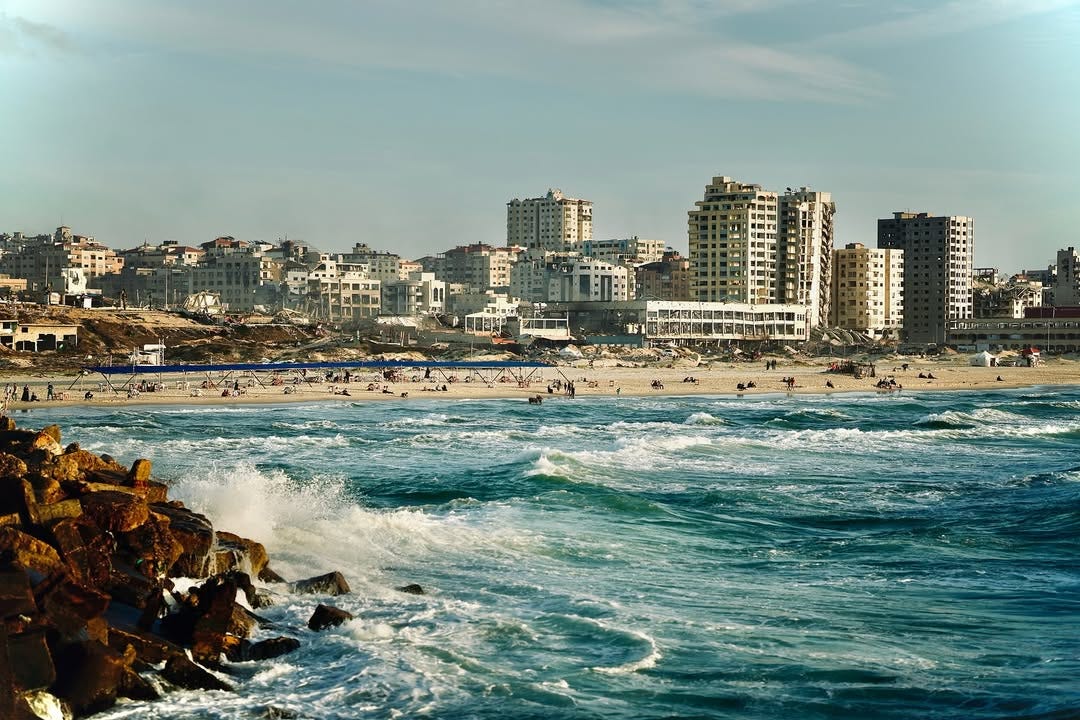
For Gazans, the sea is more than a horizon. It is our companion in a war that never ends. It is where you can sit and tell it everything that burdens you. We know the sea deeply, as we know ourselves. It holds the cries of many people and carries the weight of memories too heavy for land.
It is where we go to breathe when the air around us is heavy with fear. It is where children laugh without needing permission. Where lovers walk hand in hand. Where fishermen toss their nets and pray to return with dinner. It is where grief is released, hope is planted, and memories are made.
Before this genocide, weekends meant family beach trips, full of preparation and joy. My little brother and cousins packed their swim gear and beach toys with excitement glowing in their eyes. My parents, uncles, and aunts readied fruit, vegetables, towels, beach chairs, breakfast, snacks, and tea with mint.
We would leave in the early morning, catching birds flying high and glimpses of fishermen returning with sardines. We would lay out our breakfast — warm bread rolls, creamy hummus, crunchy falafel, za’atar, olive oil, green and black olives, crumbly cheese, olives, salty pickles, red chilli pepper, and hot mint-infused tea — and eat them with the sound of waves in our ears and the sound of Fairuz playing softly. Enjoying our breakfast while looking at the sea, taking in the fresh breeze, and hearing the sound of the waves has always been our special moment.
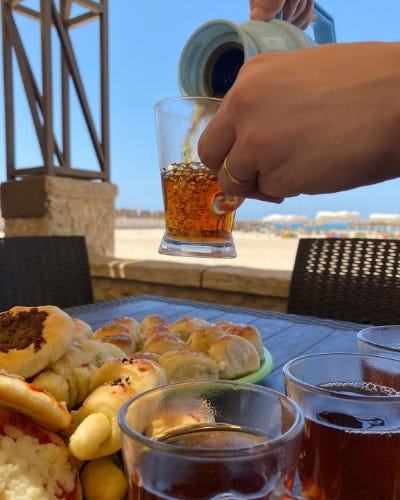
Later, vendors would come with grilled corn and candy apples. Camels and horses walked the shore offering rides. Children would build sandcastles and fly kites, youth would play football or volleyball, men would swim when the water was gentle, women would exchange chats with each other, girls would sit beside the beach to enjoy the water while eating ice cream, and parents would swim with their little children joyfully.
My favourite part was always enjoying the sunset and taking some photos of it. When the sun finally disappeared into the waves, the music began. Some would beat tablas and sing; others played their favourite songs from playlists on their phones.
At night, the golden lights illuminated the beachside. The scent of delicious pastries fills the air with the scent of tea with mint. Snacks, chips, nuts, biscuits, chocolates, and coffee would be laid on plates. Our mood would be lifted with the beautiful music of Um Kulthum and Abd al-Halim Hafez. These were the sounds and smells of life before everything was scorched. Men were playing chess, and we were playing chess and cards.
The laughter did not stop until midnight. That was our Gaza. That was our beach.
I sometimes used to walk next to the sea with my dad and brother at 10pm on winter nights. Sometimes, when I felt overwhelmed with exams or burdened with the weight of the world, I would walk along the shore at 7am, then head to a beachside cafe with my friends. I would order coffee or cappuccino and watch the magical view of the sunset, listen to my favourite songs, write in my journal notebook or read a book, and take some nice photos of the sunset. The cool breeze on my face felt like a secret between me and the waves.
Al-Baqa cafe
But now? Now we are being bombed alive.
In Gaza, a café is not a place for leisure or entertainment. It has become a graveyard.
On 30 June 2025, in the blink of an eye, a deadly airstrike hit Al-Baqa cafe on the Gaza City shoreline, killing more than 30 Palestinians who had gathered for a moment of peace and injuring dozens. Among the martyrs was Ismail Abu Hattab. Ismail loved the sea — he was always sharing photos of it. Sunsets, boats and waves.
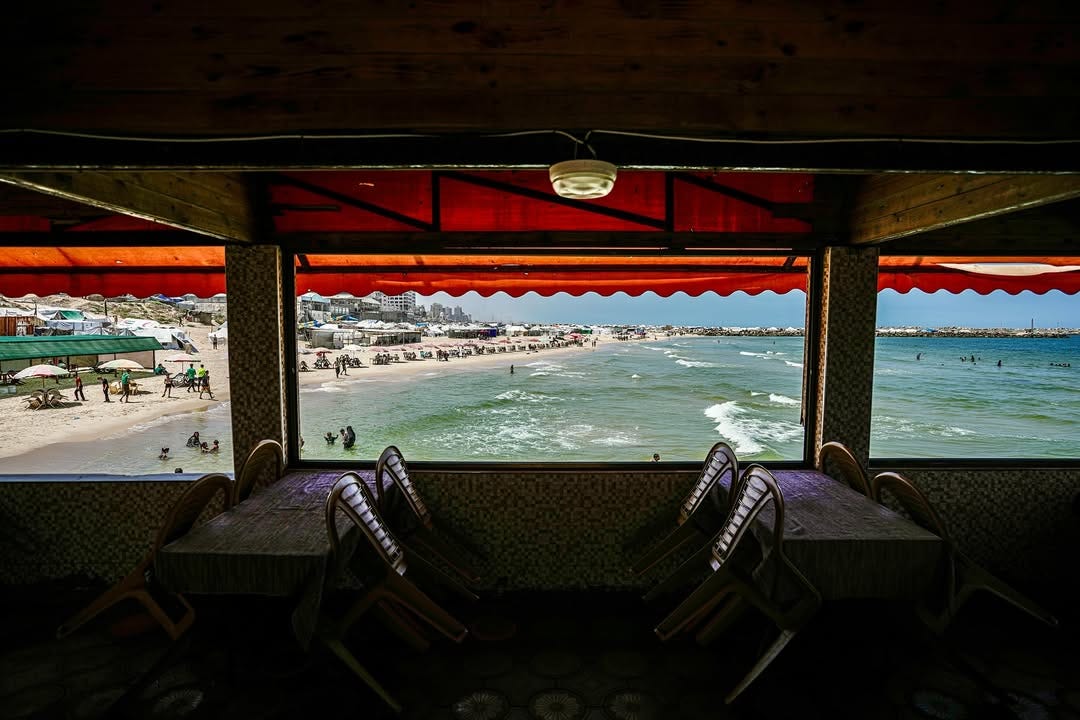
No one can understand what Al-Baqa café always meant to us. Al-Baqa café might have appeared like any other cafe. But to those who have lived through the siege of Gaza, it was much more than a place; it was a place that looked like them. It brought together artists, students, families, friends, lovers, and volunteers. Not simply for its beauty (though it had that), but because it gave people a rare chance to feel alive, to breathe freely, even if only for a little while.
How can a place of life become a place of death? How can a café with nothing more than coffee cups and laughter be turned into a mass grave?
The sea, once a place of peace and escape, now stretches behind rows of makeshift tents scattered along the shore — tents stitched from tarps, worn blankets, and scraps of plastic. Under the scorching July sun, they bake in the heat with creepy insects and mosquitoes. On the beach, you can see pale, wrinkled, exhausted faces filled with grief and despair. Everything is out in the open - there is no longer privacy in Gaza.
The shoreline is too crowded with tents now. The breeze that once brought relief now carries the scent of struggle. No joy to be found there except for the breeze. People sit in the sea hoping to cool down.
People gather by the water, not for leisure, but for survival. Women scrub dishes with seawater and handfuls of sand, their movements slow and exhausted. Clothes are washed the same way, draped over rocks to dry beneath the unrelenting sun. Children, stripped down to survive the heat, are bathed in the sea.
This isn’t a summer by the sea. It’s a life displaced, a coastline-turned-shelter, and a shoreline pregnant with the sounds of survival.
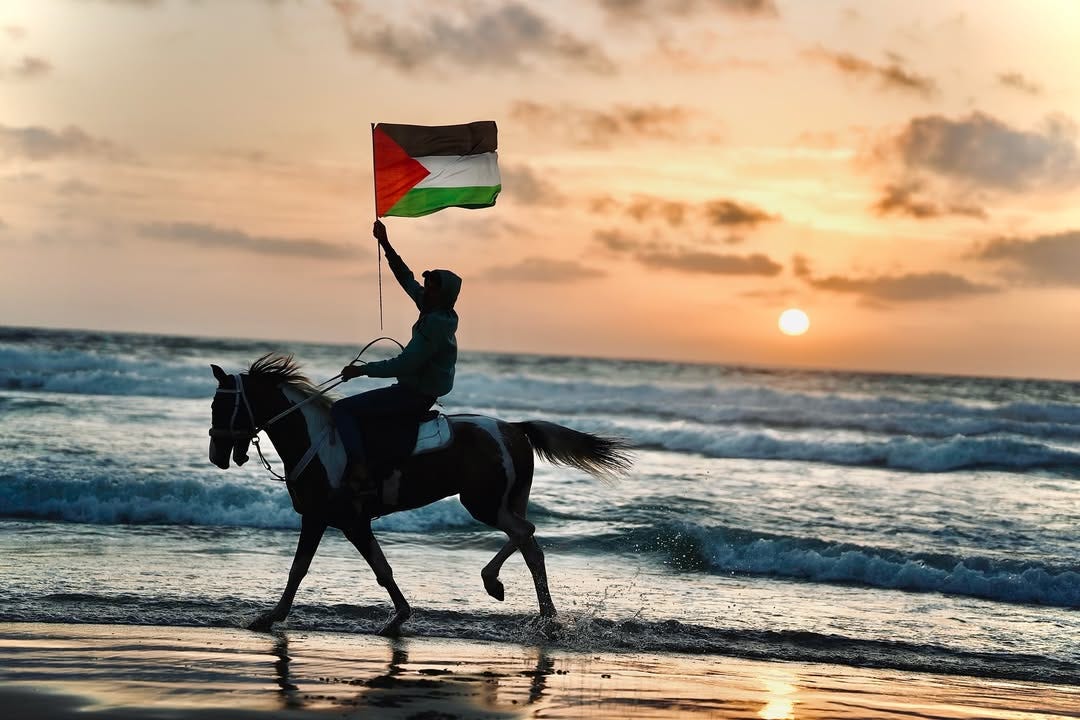
The sea as salvation
Israel has recently declared the entire sea off-limits, transforming even this last refuge and therapy into a target. The Israeli army posted that the people of Gaza are not allowed to enter the sea and that people who do enter will be at risk. Boats can no longer sail, even for fishing. No cast nets, no children chasing waves. The sea that once gave us life is now surrounded by gunboats and military drones. It is a wall of water now, surveilled, forbidden, and militarised. Yet, children are swimming in it despite the declaration. If the Israeli occupation were able to control the air, they would definitely forbid us from it.
However, while they may block our view with gunships and drown our boats in sound and flame, the sea is eternal. They can fill it with gunboats, they can block aid ships, they can chase fishermen — but they cannot erase what it means to us, and they cannot uproot our love and memories of it. They cannot erase the view of the blue sea, the golden sun sinking in it, the sound of waves breaking on stone, or the memory of little feet running toward the water.
No one can bomb away our memories. No drone can kill our connection to the sea. No order from the Israeli navy can erase the scent of grilled corn on a summer afternoon or the sound of tablas under the stars.
On 1 June 2025, Madleen, the small aid ship, departed from Italy, aiming to reach Gaza in defiance of Israel’s blockade and to show solidarity with Palestinians. Just eight days later, in the dark of night, the Israeli navy intercepted the ship, seizing the vessel and detaining the entire crew.
Despite knowing the risks, Madleen’s crew was committed to delivering their powerful message. As Greta Thunberg stated, “We are witnessing the deliberate starvation of two million people. The world cannot look away. Each of us has a duty to act for a free Palestine.”
Though Israel may have physically blocked Madleen from reaching Gaza, it failed to silence its message. The Madleen proves that it doesn’t take a superpower to reach Gaza. All you need is brave humans with the will to stand up against oppression and tyranny. In fact, at this moment another boat, the Handala, is continuing the work of the Freedom Flotilla and is on its way to break the blockade. While it may face similar obstacles, the legacy of Madleen lives on. It brought more than food and supplies — it carried a message of hope: Gaza, you are not forgotten.
The sea has always been our own escape, companion, and direction. It is the only entertaining place in Gaza – even before the genocide. The sea connects us to the world. While land is besieged by borders, the sea still touches every shore. Beyond it lies the world we are exiled from — lands we cannot reach, people we cannot meet, but also, a promise we refuse to relinquish. It reminds Gazans that the world is bigger than the wall that cages them. No matter how many blockades are imposed, no one can blockade the tide, and no drone can conquer the deep.
Children once built sandcastles on the sea's shores, families gathered there at sunset, and lovers carved names into its wet stones and sand as they walked beside it hand in hand. The sea remembers the laughter before the drones, the kites before the airstrikes, and the weddings before the funerals. It is where many took their first steps into joy. It is where birthday candles were blown out. The sea mourns with Gaza, but it also whispers hope.
Huda Skaik is an English literature student and a journalistic writer from Gaza. She is a member of We Are Not Numbers, and she also a contributor for The Intercept, The New Arab, Electronic Intifada, Middle East Eye and WRMEA. She has a strong interest in reporting and writing.
Follow her on Instagram: @Huda_Skaik



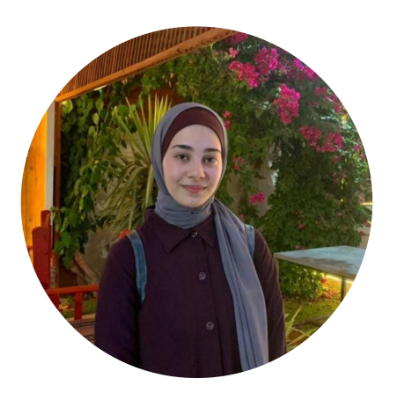

Thank you, Huda. Our hearts are breaking for Palestine. 'The sea mourns... The sea remembers...'
It was a joy to share these memories of the beach and t h e sea these memories can now never be lost or forgotten but it was saddening to picture in ones minds eye how beach and sea is now .
But I believe you Palestinians and us who will visit will rejoice on your shore
Free Palestine